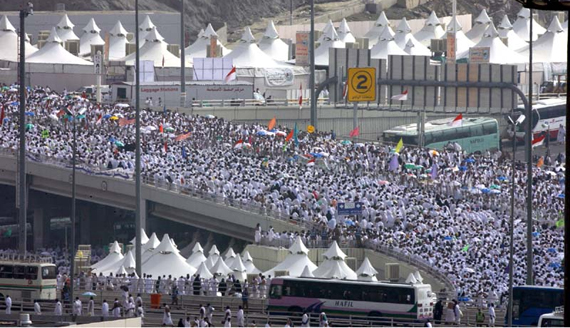
Jeddah, Jun 16: In an unprecedented move aimed at preventing congestion and stampedes and ensuring safety of the guests of God, Saudi authorities have urged domestic and foreign pilgrims to postpone their Haj plans for this year if possible due to ongoing expansion work at Makkah’s Grand Mosque.
The call follows the government’s decision to reduce the number of foreign pilgrims by 20 percent and domestic pilgrims 50 percent this year. Grand Mufti Sheikh Abdul Aziz Al-Asheikh has backed the measure, saying it was taken in public interest.
In a series of announcements through the Holy Qur’an television channel, which is aired from Makkah, the government advised pilgrims intending to perform Haj and Umrah this year to postpone their plans to reduce congestion at the Grand Mosque.
“By making this announcement our government is not preventing anybody from Haj, but asking them to postpone in order to avoid congestion and help first-time Hajis to perform their religious duties without difficulties,” Saeed Al-Qurashi, a member of the Haj & Umrah Committee at Makkah Chamber of Commerce and Industry, told Arab News.
He said the mataf (the circumambulation area around the Holy Kaaba) could hold now only 39,000 faithful per hour, suggesting an influx of a large number of pilgrims could cause congestion inside the mosque.
“Once the mataf expansion is completed, it can accommodate more than 130,000 pilgrims per hour. So, it would be better for our brethren to come for Haj next year or after two years, when they will be able to perform their rituals with ease,” he explained.
Hatem Qadi, deputy Haj minister and spokesman of the ministry, emphasized the need for reducing the number of foreign and domestic pilgrims this year.
“The period for cutting the number of pilgrims will not exceed two years,” he said. The ongoing expansion work at the two holy mosques are aimed at accommodating more pilgrims in the coming years, he pointed out.
Qadi cited the grand mufti’s statement on the issue saying the government took the decision because it was essential. “The ongoing expansion is for the benefit of pilgrims,” the mufti said.
Mohammed Noor Rahman Sheikh, Indian consul for Haj, said his country would send more than 170,000 pilgrims this year. “We have been informed about the government’s plan to cut the number of foreign pilgrims by 20 percent,” he told Arab News.





Comments
Add new comment